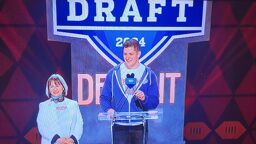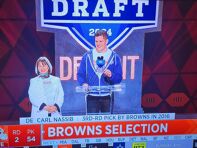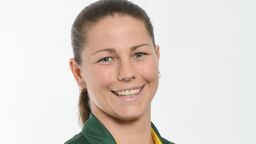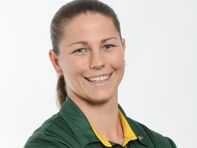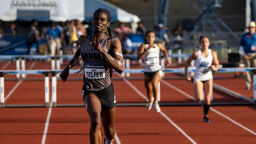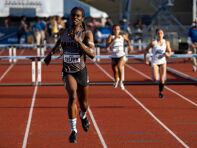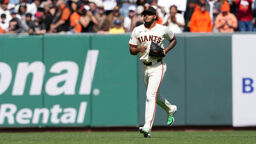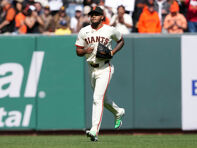By Derek Schell
For the past 12 years, I have known at least four things to be true: the blue Power Ranger was the best Power Ranger; no one can coach basketball better than Mike Krzyzewski; the Green Bay Packers stand for everything that’s right in this world; and I have always been different. I fully accepted the greatness of the first three, but tirelessly fought the last. For the longest time, I didn’t exactly know what this different was. The turning point in my journey was the day I realized and accepted that this difference meant that I was gay.
My name is Derek Schell, 22 years old from New Berlin, Wisc., a suburb of Milwaukee. I am a 6-1 senior guard for Division II Hillsdale College in south central Michigan. Since I can remember, the fear of being different led me to act differently in separate aspects of life. I found my escape in the gym, losing myself in training for and learning the sport I love. I excelled in the classroom, studying and using my creativity to draw attention to my scholastic identity rather than personal characteristics.
Aside from that I was silent, keeping my emotions — and my trust — to myself, analyzing why I did not fit into my world the way I wanted to. From middle school to high school, confusion about where and how I belonged led to depression and anxiety. I prayed I would see the light and all of it would just disappear, but the sleepless nights and undefined sadness had control.
I hid these feelings from everyone close to me and "I’m fine" became my personal motto. As a star athlete and a successful student, I held a high social rank at a prestigious Catholic high school. For most 17-year-olds, that is a dream come true. For me, it was a nightmare. I became part of a group of people from whom certain things were expected, including being honor roll students and varsity athletes. My friends, my parents, my sister, my teachers — everyone expected me to be an all-star, to help lead the basketball team to a state championship and to date a pretty girl. I wanted people to accept me and to embrace me, so I let those expectations take control. I hid who I was so that I wouldn't let other people down. It was much later that I realized that the problem was not that I didn't fit into my world the way that I wanted to. The problem was that my world didn't fit who I was. It fit the guy I was trying to be, but it didn't fit Derek.
To be honest, I got good grades. I won a state championship. I dated pretty girls. And yet something still wasn’t right. By that time, I figured meeting those expectations would make me feel more comfortable about who I was and how I fit in. I was sure that my low self-esteem and insecurities about myself would fade away. I always identified primarily as an athlete. Both of my parents were prominent Division II basketball players in Pennsylvania and my sister was a three-sport athlete who eventually played Division I basketball. Growing up around sports and an athletic family (including my extended family), I had an appreciation of what it meant to live and act like an athlete and I strived to live up to those standards. At the same time, I developed an emotional connection to more creative outlets like music, art, and photography and recognized my attraction to men. Those feelings conflicted with my understanding of being an athlete and I couldn’t figure out how to make those two concepts coexist. Who I was becoming contradicted who I thought I was supposed to become.
I felt alone, isolated by my feelings, and I was sure I was the only person who felt like this. At that point, I had no trust in myself to open up to anyone around me. At home and at school, most people had never even met a gay person. I grew up in an area of rich, white, straight people of the middle- to upper-class. There were stigmas about being gay and misconceptions about masculinity that I refused to confront. It was the systematic lifestyle and viewpoint of where I grew up. The majority of the time, children, parents and their parents’ parents adopted the same conservative ideals about family and "morality" that were socialized throughout generations. They believed what they were told. Their religions aligned with their conservative convictions of gay people.
Whether someone believed it was wrong, a sin, or just abnormal, I heard every gay slur in the book, directed at me and at others, just because it was, and unfortunately still is, part of our society’s language. For awhile, I truly did accept these lessons. In middle school, when I realized that my difference was my sexuality, these lessons became the controversy clouding my whole outlook on my future self. I thought that I couldn’t be a Christian and also be gay. People would assume I act feminine and I would be an outcast in my social group and as an athlete. I constantly felt like I was walking on eggshells, afraid to act a certain way or say something that may give away my truth. I pushed every worry and negative thought aside and committed to play college basketball, hoping, sometimes even praying, that I would find some sort of remedy for these thoughts I could not get rid of.
My day-to-day actions were consumed by this increasing need to hide my sexuality. As it turned out, not only could I still love the God that created me in his image, but that he loved me back. Not only was I not feminine, but I was a real man for owning my life and whom I loved. Not only was I not an outcast, but I would be more easily accepted being my whole self rather than a fragment of Derek. As a young freshman, I still did not see those things that seem so obvious to me now.
My original plan was to make a concerted effort to date girls and conceptualize marrying a woman. College was the time to think about starting to settle down and start what I thought of as a "normal" family. However, this overriding dedication to change my innate personality and desires caused a lot of internal struggle. I turned my own uncertainty into being a good friend to others, lending advice to my peers on how to live. I never managed to get the point across to myself to love myself and to be proud of who I was. I was doing exactly what I told everyone else not to do: let other people diminish my own happiness because it was my choice to be happy. Even so, the risk of losing my friends and family over being gay kept my fake smile on for a year more.
The beginning of my sophomore year of college, the only way I felt comfortably being myself was online. I met the person that I care for most in this world, my boyfriend Kevin. We have been together for two years. I began to realize that my life was my own. There was no more time for living in the hopes of pleasing others and living up to any one person’s or any societal expectation. I had to find a balance between helping and caring for others and making my happiness a priority. I came out as gay to all my closest friends because I wanted to see who was really a true friend to me. There was nothing wrong with me. I didn’t want to be someone else’s idea of normal. To me, normal is a boring, stereotypical mold that encourages conformity and trying to fit in. I just wanted to be accepted.
Three years ago, I vowed to never tell my secret. But since then, I have learned that I don’t have a secret. I eventually told my family, the three absolute rocks in my life. Although it was difficult at first, the process of acceptance and maturation in their understanding of my new-found happiness has proved me right in thinking I have the best support system that anyone could ask for.
I began to feel more comfortable telling friends at school and back home, and this past month I told my teammates and coaches. Coming out to them brought the same possibility of rejection as coming out to my family. I didn’t want our bond to change and the love I have for them as brothers and father figures to ever be tarnished.
I decided talking to them individually was better than giving a general speech at once, since I have a distinct relationship with each of them. I went to each of them and told them I treated them as brothers, since I have none biologically, and that this is just a part of me they finally deserved to know. Some said they had a feeling and were waiting for me to tell them. Some seemed surprised but nonetheless gave me credit for being open about it.
They all respected me and recognized that nothing had changed and I was the same teammate and friend that I was before. Despite attending a conservative college, I have been accepted for who I am by those on my team and others close to me. Eventually, I was so tired of living my life in fear. I was mentally exhausted. Instead, I realized that I could be an athlete, be a friend, be a son, be a brother, be an artist, and be gay as well. I could even be a huge "Glee" fan too. There never needed to be differentiation between the various aspects of my life and personality. One is not mutually exclusive of the other, and being all of these things, all at once, makes me who I am.
My excitement and passion for basketball is at an all-time high. There was a time in college where my fire died down. However, in maturing and finding acceptance, the game has shown to me why I fell in love with it way back when I was 4 years old. It is an antidote to all of life’s problems; I can always find solace in an empty gym working on my game. I’ve grown to understand that as much as I put into the game, it gives me back so much more. For 18 years, I have put in countless hours with my dad and teammates and coaches; but what it has given me is immeasurable. The bonds I have created and lessons I have learned will stay with me forever. I accomplished all of my goals as a high school player but now I could not be more ready to enjoy and succeed in my last year competing in college. With all of my brothers at my side and exciting challenges in the upcoming season, my antidote is back.
In experiencing opposite ends of the spectrum in homophobia and in unconditional love, I have learned so many things from so many different types of people and haven’t been limited to just one way of thinking. It has been a blessing in disguise. My sister’s favorite quote, "Life is too short to be anything but happy," now resonates more significantly in my life. Not only is life too short to dwell on other people’s expectations for you, but it is your decision to choose your attitude and how you react to your surroundings.
For a while I always focused on what I didn’t have and what I wasn’t, instead of loving myself for every little thing that makes me Derek. I no longer feel victimized, but rather lucky that God made me exactly who I am with the opportunities that I’ve experienced and those that lie ahead. I learned that you can never give up and you need to fight for yourself each and every day.
Sometimes the darkest times in life are only doorways to the best moments of your life, the ones you were meant to experience and live to see. I wanted to do this so that the generations to follow have an example; so that the younger LGBT youth who live afraid of who they are becoming can know they have nothing to fear and they are perfect the way they are. My challenge to you, whoever is reading this, is to be honest with yourself and how you’re feeling. God doesn’t make mistakes. Don’t keep saying you’re fine. You can be who you are and still be an athlete. You can do all the things you want to do and live a beautiful life that you’ve imagined for yourself. Find your peace of mind knowing you are giving your best self to the world. Be brave. Be love. But most of all, be you.
Derek Schell is a senior at NCAA Division II Hillsdale College, majoring in International Business, and is a guard on the men's basketball team. He can be reached via email ([email protected]) and followed on Twitter (@dschell4).



